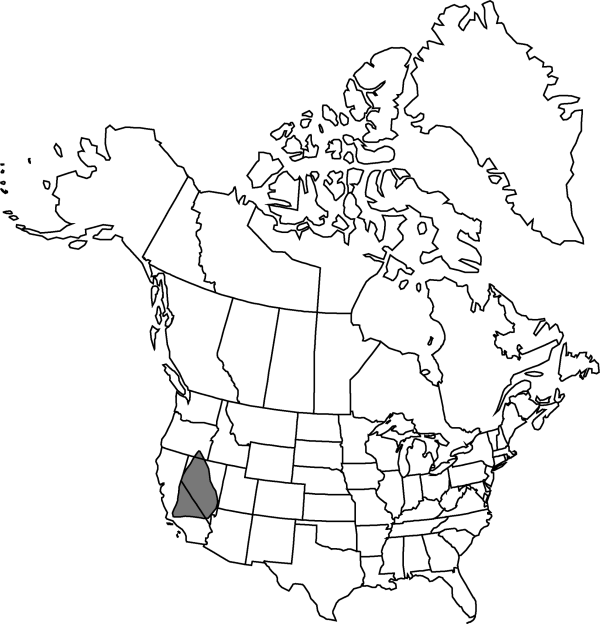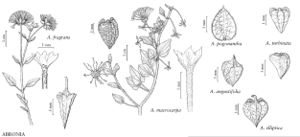Difference between revisions of "Abronia turbinata"
Botany (Fortieth Parallel), 285, plate 31, figs. 1–5, 8, 9. 1871.
FNA>Volume Importer |
imported>Volume Importer |
||
| (7 intermediate revisions by 2 users not shown) | |||
| Line 6: | Line 6: | ||
|place=285, plate 31, figs. 1–5, 8, 9. 1871 | |place=285, plate 31, figs. 1–5, 8, 9. 1871 | ||
|year=1871 | |year=1871 | ||
| + | }} | ||
| + | |special_status={{Treatment/ID/Special_status | ||
| + | |code=F | ||
| + | |label=Illustrated | ||
| + | }}{{Treatment/ID/Special_status | ||
| + | |code=E | ||
| + | |label=Endemic | ||
}} | }} | ||
|basionyms= | |basionyms= | ||
| Line 16: | Line 23: | ||
}}<!-- | }}<!-- | ||
| − | --><span class="statement" id="st- | + | --><span class="statement" id="st-undefined" data-properties=""><b>Plants </b>annual, infrequently perennial. <b>Stems</b> decumbent to ascending, much branched, elongate, reddish at least basally, glandular-pubescent, rarely glabrous or viscid-pubescent. <b>Leaves</b>: petiole 1–4.5 cm; blade broadly ovate to orbiculate, 1–5 × 0.5–3 cm, margins entire or ± repand and undulate, surfaces glabrous or sparsely glandular-pubescent. <b>Inflorescences</b>: peduncle longer than subtending petiole; bracts lanceolate to ovate, 3–10 × 1–5 mm, papery, puberulent to densely glandular-pubescent; flowers 15–35. <b>Perianth</b>: tube greenish to coral pink, 6–18 mm, limb white to pale pink, 5–8 mm diam. <b>Fruits</b> winged, turbinate, 3–8 × 3–6 mm, coriaceous, apex broadly tapered to prominent beak; wings (2–)5 (when 2, folded together) truncate distally with conspicuous dilations, cavities extending throughout.</span><!-- |
-->{{Treatment/Body | -->{{Treatment/Body | ||
| + | |phenology=Flowering spring–fall. | ||
|habitat=Sandy soils, desert scrub | |habitat=Sandy soils, desert scrub | ||
|elevation=900-2500 m | |elevation=900-2500 m | ||
| Line 30: | Line 38: | ||
-->{{#Taxon: | -->{{#Taxon: | ||
name=Abronia turbinata | name=Abronia turbinata | ||
| − | |||
|authority=Torrey ex S. Watson | |authority=Torrey ex S. Watson | ||
|rank=species | |rank=species | ||
| Line 37: | Line 44: | ||
|basionyms= | |basionyms= | ||
|family=Nyctaginaceae | |family=Nyctaginaceae | ||
| + | |phenology=Flowering spring–fall. | ||
|habitat=Sandy soils, desert scrub | |habitat=Sandy soils, desert scrub | ||
|elevation=900-2500 m | |elevation=900-2500 m | ||
| Line 43: | Line 51: | ||
|publication title=Botany (Fortieth Parallel), | |publication title=Botany (Fortieth Parallel), | ||
|publication year=1871 | |publication year=1871 | ||
| − | |special status= | + | |special status=Illustrated;Endemic |
| − | |source xml=https:// | + | |source xml=https://bitbucket.org/aafc-mbb/fna-data-curation/src/2e0870ddd59836b60bcf96646a41e87ea5a5943a/coarse_grained_fna_xml/V4/V4_129.xml |
|genus=Abronia | |genus=Abronia | ||
|species=Abronia turbinata | |species=Abronia turbinata | ||
| − | |||
| − | |||
| − | |||
| − | |||
| − | |||
| − | |||
| − | |||
| − | |||
| − | |||
| − | |||
| − | |||
| − | |||
| − | |||
| − | |||
| − | |||
| − | |||
| − | |||
| − | |||
| − | |||
| − | |||
| − | |||
| − | |||
| − | |||
| − | |||
| − | |||
| − | |||
| − | |||
| − | |||
| − | |||
| − | |||
| − | |||
| − | |||
| − | |||
| − | |||
}}<!-- | }}<!-- | ||
-->[[Category:Treatment]][[Category:Abronia]] | -->[[Category:Treatment]][[Category:Abronia]] | ||
Latest revision as of 21:56, 5 November 2020
Plants annual, infrequently perennial. Stems decumbent to ascending, much branched, elongate, reddish at least basally, glandular-pubescent, rarely glabrous or viscid-pubescent. Leaves: petiole 1–4.5 cm; blade broadly ovate to orbiculate, 1–5 × 0.5–3 cm, margins entire or ± repand and undulate, surfaces glabrous or sparsely glandular-pubescent. Inflorescences: peduncle longer than subtending petiole; bracts lanceolate to ovate, 3–10 × 1–5 mm, papery, puberulent to densely glandular-pubescent; flowers 15–35. Perianth: tube greenish to coral pink, 6–18 mm, limb white to pale pink, 5–8 mm diam. Fruits winged, turbinate, 3–8 × 3–6 mm, coriaceous, apex broadly tapered to prominent beak; wings (2–)5 (when 2, folded together) truncate distally with conspicuous dilations, cavities extending throughout.
Phenology: Flowering spring–fall.
Habitat: Sandy soils, desert scrub
Elevation: 900-2500 m
Distribution

Calif., Nev., Oreg.
Discussion
Selected References
None.
